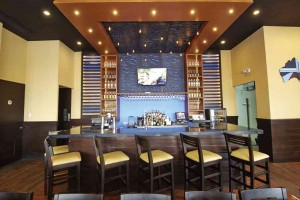
OUTBACK Steakhouse newest branch at Bluebay Walk in Pasay City brings in more light to make it attractive to families and the younger crowd.
“Expansion” was a word Prasoon Mukherjee repeatedly used to talk about the past, present and future of his favorite restaurant, Outback Steakhouse.
Mukherjee is the chair of Universal Success Enterprises (USE) Group, which gave Southeast Asia the Outback Steakhouse chain of restaurants.
His love affair with the steakhouse chain with more than 1,000 locations in 22 countries began in Jakarta, Indonesia, where he first tasted Outback’s offerings.
The day after, he got in touch with the owner of Outback Steakhouse to talk about acquiring a franchise.
“I knew that it would work in our part of the world,” said Mukherjee, whose first foray into entrepreneurship in 1995 involved energy trading.
The Singapore-based entrepreneur opened his first Outback restaurant in Singapore in 2002.
He said the initial challenge he faced there was telling everybody what Outback was all about.
“We had advertisements on buses featuring kangaroos. But people thought Outback was selling kangaroo meat,” he said.
Fortunately, he had students to turn to.
He noticed that hundreds of students in Southeast Asia studied abroad and they eventually became his top brand ambassadors.
“They told their parents [back home] about how good the food is in Outback,” he said.
From Singapore, Mukherjee found his way to the Philippines where Outback Steakhouse has been operating since 1997.
The franchise was originally owned by the Bistro group, which set up branches in Libis, Makati and Alabang.
In 2010, Mukherjee acquired the franchise from the Bistro group and one of his first moves was to tweak the interiors.
“Our branches here have the usual steakhouse look—dark and heavy. I wanted to use more glass and bring in more light [to make them more] suitable for families and the younger crowd,” he explained.
The recent addition to the chain’s growing family is the 170-seater store at Bluebay Walk on Macapagal Avenue, Pasay City.
Mukherjee said he was attracted to the Philippines by two major factors—friendly staff members and the country’s growing middle class.
He said the Philippines had the “friendliest staff in the world. Very, very hospitable and is the easiest to train.”
The fast-growing middle class, on the other hand, represented a large potential market for concepts such as Outback.
“Return on investment is high in the Philippines. We see this as a profitable place,” he said.
Mukherjee plans to open five more restaurants in the next five years but he prefers to concentrate first on Metro Manila.
“But if we get a good location in Cebu, then why not?” he said.
Mukherjee indeed is looking forward to doing more business in the Philippines.
“Good governance makes foreigners like me have faith in putting money in your country. We definitely want to expand our food business here,” he said.
Mukherjee, who was born in Calcutta, India, is proud of the quality of the food served by Outback.
“Each restaurant has its own kitchen. We have no commissary. And I’m very proud of our kitchen. It’s like the ‘Rolls Royce’ kitchen with the most sophisticated equipment and the cleanest, too,” he said.
Outback has an extensive menu that includes chicken and seafood dishes, salads, soups, sides, pasta and desserts.
But it is the steak that makes customers come back.
Mukherjee said Outback’s credo was to offer the best-tasting, high-quality steaks at a more affordable price.
“We don’t mind having a smaller profit margin as long as we provide the best to our customers,” he said.
He also shared that Outback may be named after the vast Australian region, but it is actually an American brand that originated in Florida in 1988.
The founder, Chris Sullivan—who made some money after retirement—was inspired to set up an Australian-themed restaurant after watching “Crocodile Dundee,” a popular movie featuring life in the outback.
Sullivan went to Australia for the first time during the Sydney Olympics in 2000 and by then already had 700 Outback branches in the United States.
With a solid foundation in the United States, Outback has turned aggressive in its expansion stance with sights set on increasing its footprint in Asia.
To bolster his own network, Mukherjee said he helps operating partners have shares in the restaurant.
“We loan them money to buy shares. It becomes an incentive for them. And I’ve noticed that it increases the people’s commitment and involvement in the restaurant. We treat each other like ‘partners’ not just employees. It gives the operating partners a sense of ownership. It becomes everybody’s restaurant,” he explained.
So far, it has been an effective incentive, especially for the wait staff who are usually rotated to Singapore and Malaysia to work and sometimes assist in setting up a new branch.
“We have close to 30 Filipinos working in Outback abroad. They treat customers very well,” he added.
And happy customers have made for a profitable Outback chain under Mukherjee’s watch.